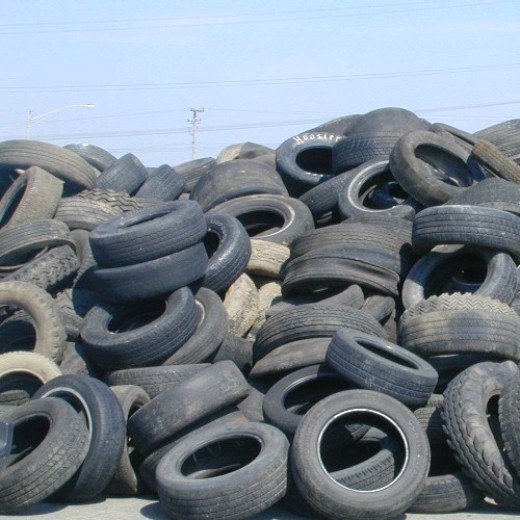Tires
Summary of Tire Disposal:
- The state of Illinois no longer offers annual collections of tires at no charge.
- All retailers of tires are required by state law to accept tires for recycling for a fee.
- Improperly stored tires may create breeding situations for mosquitoes and a fire hazard.
Tires Banned from Landfills 
On July 1, 1994, whole tires were banned from landfill disposal in the state of Illinois. As a result, several procedures, such as built-in costs at the time of purchase, have been enacted to assist with proper tire disposal.
Tire retailers are required to accept your old tires when you purchase new ones. Thus, the company is responsible for ensuring that tires received are disposed of properly.
Tire retailers are required by Illinois law to charge an additional fee per tire in the purchase price of new tires.
The fees collected are deposited into the Illinois Department of Revenue's Used Tire Management Fund, which provides funding on a state and local level to encourage proper waste tire management and to reduce the health, environmental and economic impact they may cause.
Uses for Recycled Tires
- The average car tire contains 7 gallons of oil.
- Some tires are refurbished and sold as retreads, containing up to 75% recycled rubber.
- Of the over 15 million tires collected in Illinois annually, up to 75% are chipped and turned into Tire-Derived Fuel(TDF). This fuel is used in industrial boilers and coal burning power plants. The BTU value helps coal burn cleaner
- Tires may be ground or chipped in a variety of items, such as Rubber Modified Asphalt (RMA). This new recycled material may be used on roads, bicycle paths, running and equestrian tracks.
- Tire chips and other forms of scrap rubber can be used for civil engineering projects, such as soil erosion prevention walls, guard rail pads, and colorful commercial landscaping.
- The most fun use is when chipped tires are used as playground material, increasing safety.
Improper Disposal Hazards
- Rainwater tends to collect in stockpiled tires, which then become a breeding ground for mosquitoes that carry dangerous diseases such as West Nile virus and encephalitis. Over the course of one breeding season, hundreds of mosquitoes can be generated from just one tire.
- Stockpiled tires are a fire hazard which could produce toxic smoke and oils when ignited. This, in turn, can lead to the pollution of land, water and air.
- Tires tend to rise to the top of landfills, destroying engineered layers and endangering workers.
- Improperly disposed tires can encourage illegal or random dumping.
What to do with unwanted tires?
- Do not store and accumulate your old tires. Trade them in when you purchase new ones.
- When asked whether you would like to keep your old tires, say "NO" unless you have a specific purpose in mind.
Tire Recycling Locations
Beecher
Bahlman Tire & Supply
Bolingbrook
Just Tires
Channahon
Lucenta Tire
Frankfort
Tire Tracks
Joliet
Discount Tire Co.
Tire Tracks
Treadstone Tire Recycling
Lockport
Dellwood Tire
Robert's Tire & Auto
New Lenox
Spencer Auto Salvage
Orland Park
Empire Tire & Battery
Rockdale
Pomps Tire & Align
Shorewood
Tire Tracks
Steger
Scott's U-Save
Tinley Park
VIP Tire Co.
Wilmington
Tire Tracks
The following list of locations may help with disposal of accumulated tires. The Illinois EPA offers a page of information on tire recycling for large accumulations on their Used Tire Processor page. Please click Here to be directed to our Green Guide Database where you can learn more information about the following locations.
Click Here to download the PDF Tire Brochure